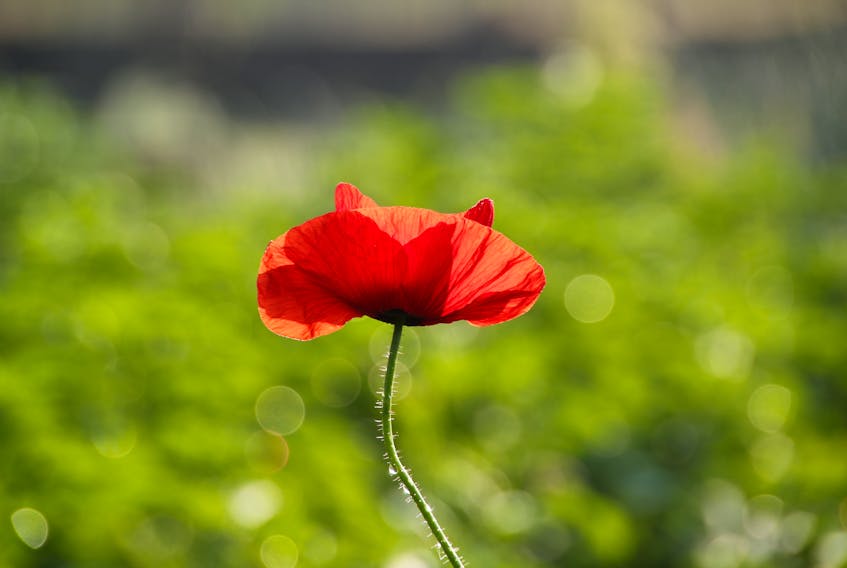They shall grow not old, as we that are left grow old:
Age shall not weary them, nor the years condemn.
At the going down of the sun and in the morning
We will remember them.
These lines from the poem For the Fallen, written by Laurence Binyon will be familiar to anyone who attends Remembrance Day ceremonies such as those that will be held across Canada this coming Monday, Nov. 11, but do we really understand their deep meaning?
I find that when these lines are recited, it’s one of the most sombre moments of any Remembrance Day ceremony, as these words are a stark reminder of the hundreds of thousands of Canadian men and women who have made — and who continue to make — the ultimate sacrifice in wars both past and present so that you and I can enjoy the freedoms we take for granted each and every day.
This year’s remembrances are especially poignant because, coming as they do following the recent federal election, we have just experienced one of the greatest gifts our heroes have given us: the right to vote.
I’ve heard these words a great deal over the years as I’ve attended Remembrance Day ceremonies and I’ve marveled at the powerful message contained in these four short lines. Since Canadians will pause on Nov. 11 to remember their fallen heroes and to honour those who are still with us, I thought it appropriate to take a closer look at these words.
While they are the most familiar lines, the above stanza is, in fact, only a portion of Binyon’s best-known poem, but they have become the lasting symbol of remembrance. For those of you who don’t know the story, Binyon composed the poem while sitting on a cliff-top looking out to sea from the dramatic scenery of the north Cornish coastline at Pentire Point, north of Polzeath.
According to a website dedicated to Binyon, the poem was written in mid-September 1914, a few weeks after the outbreak of the First World War. During these weeks the British Expeditionary Force had suffered casualties following its first encounter with the Imperial German Army at the Battle of Mons on Aug. 23, its rearguard action during the retreat from Mons in late August and the Battle of Le Cateau on August 26, and its participation with the French Army in holding up the Imperial German Army at the First Battle of the Marne between Sept. 5-9, 1914.
Binyon said in 1939 that the four lines of the fourth stanza (quoted above) came to him first. These words of the fourth stanza have become especially familiar and famous, having been adopted by the Royal British Legion as an Exhortation for ceremonies of Remembrance to commemorate fallen servicemen and women.
Like our British friends, Canadian Legions have also adopted the poem, which will be repeated hundreds of times across this country on Monday. It saddens me, however, to think that while many Canadians will pause to honour our war heroes during these Remembrance Day services, some Canadians look at Nov. 11 as just another holiday. That is disheartening, indeed.
I was recently reminded of this reality when I overheard two young people (by young I mean in their 20s or 30s) talking about how many holidays there were between Labour Day and Christmas. It was their cavalier attitude toward Nov. 11 that struck me the most when I heard one of them say they look forward to these days to get caught up on their sleep.
Seriously, I thought, resisting the urge to break into their conversation and remind them of the importance of Remembrance Day. In hindsight, perhaps I should have done so, but I’m sure my attempt to educate these two young men would have been soundly rejected and I suppose that in a free country — one of the very things we give thanks for on Remembrance Day — they have the right to use their “day off” any way they see fit.
However, I should have reminded them that Nov. 11 is not just another “day off.” While many take advantage of the day to relax and get caught up on their chores, it’s not just a day to sleep in or party. In fact, Nov. 11 is a day to say thank you and to remember all those Canadians who have made the ultimate sacrifice so that our generation will not suffer the oppression and horrors of war.
For the record, here are the numbers of Canadian military personnel killed while serving their country: First World War, 66,665; Second World War, 46,998; Korea, 516; peacekeeping postings, 121; and Afghanistan, 157.
When I attend a Remembrance Day service and hear the names of those who died, perhaps alone and terrified in some far off land away from their loved ones, it causes me to shiver. I cannot even begin to imagine the horrors of war but I am thankful for those who paid the ultimate price so that I can enjoy the life I lead today.
While Nov. 11 is set aside every year to remember the past sacrifices so many have made over the years, it’s also a good time to wonder what our world would be like if war and strife did not exist.
In an ideal world, wars would not exist and our brave men and women would not have to put themselves in harm’s way. However, as history has shown us, this is not a perfect world. War has existed for centuries and, sadly, it appears as though it will be with us well into the future.
Our world would be a lot different today were it not for the brave men and women who stood up to those who would do us harm. Surely, we can all set aside a few hours one day of the year to say thank you for their sacrifices.
Too many fought and died for us to ever forget. Sacrifices made by those Canadians must not be forgotten or at least that’s the view from here.
Vernon Oickle writes The View From Here column, which appears weekly in the South Shore Breaker. He can be reached at [email protected]









